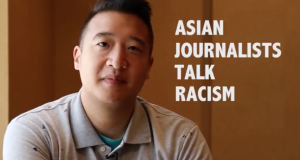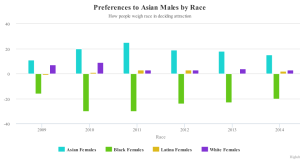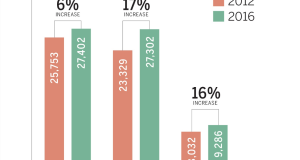Many journalists, whether experienced or recent graduates, have a sense of uncertainty when it comes to freelancing. Saying “I’m a freelance journalist” is often perceived as an incomplete job description.
However, recruiters at this year’s convention are talking long-term contracts and even accepting the idea of doing contractual jobs.
“Not having to fight a boss about a story you want to tell is really important, because having passion for the stories you’re telling gives the energy to go full force on your reporting to dig deeper into subjects.”
– Ursula Liang
For M. Cat Sandoval, a multimedia journalist in New York City, her freelance career started as a recovery plan after she lost her full-time position. The process of discovering freelance projects took time, but Sandoval, 32, pursued the path and has been a freelancer for five years.
“It’s an exciting time for journalists,” says Sandoval, the president of AAJA’s New York chapter. “You have the ups and the downs. As a freelancer you get to create something new and different; you get to make something a business.
The scope in freelancing is broad. Sandoval should know: Her proficiency with print, broadcast and online has steadily built her reputation among fellow freelancers and even bagged projects she would have had to wait years to get in a conventional office setup.
Ursula Liang, a freelance multimedia journalist from the Bronx, said her passion is waking up to a project she can call her own, from idea to product.
“Not having to fight a boss about a story you want to tell is really important, because having passion for the stories you’re telling gives the energy to go full force on your reporting to dig deeper into subjects,” she said.
As a freelancer, Sandoval admits that it’s not as “free” as one would imagine it to be. There are tough times, hard decisions and most of all, tenacity for the job. But she said being a freelancer doesn’t take away the legitimacy of the job.
Sandoval has received appreciation for her work but has also faced her share of failures. She overcame them because of her strong freelancing network.
“I recently lost a big client of mine,” Sandoval said. “You can’t be dependent on one client. Despite losing that big client, I could go to other clients to ask if they can give me anything else.”
That’s exactly what freelancing does. Instead of networking only at journalism conventions, freelance journalists do it every day.
By hiring freelancers, companies can avoid paying for benefits while reducing expenditures on equipment and production costs.
Mandy Jenkins, interactives director for Digital First Media, said she believes freelancing is a good measuring scale of a journalist’s ability to do the job well in a full-time capacity.
The approach worked for Shanika Gunaratna, who did freelance work before being hired as an associate producer for Chicago television station WTTW.
And young journalists are taking note. While there will always be a pull-and-push mechanism of employment in journalism, there are small incentives that don’t cost much for any freelance journalist.
“It’s really a joy to decide what you want to do, and that feeling is irreplaceable. And no paycheck buys that,” says Liang.
 VOICES Publishing from the AAJA National Convention
VOICES Publishing from the AAJA National Convention

